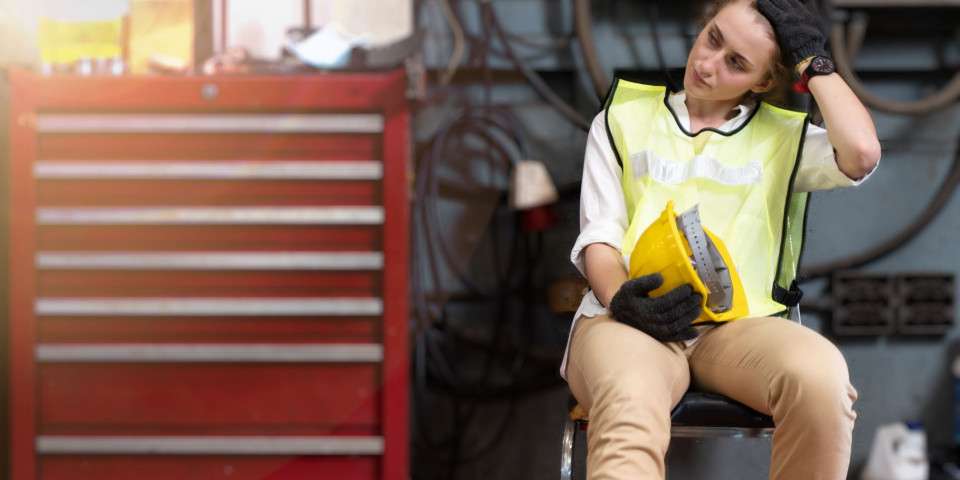Latest News
Construction Mental Health Report from CITB
Posted on Friday, 27th August 2021

Earlier this month, CITB released their Mental Health and Wellbeing Research Report to find out what more can be done to support the mental wellbeing of workers in the construction sector. In today’s blog we take a look at the findings and recommendations of the report to see how they could improve mental health across the sector.
What is mental health and wellbeing?
Before we look into the report, we need to establish what we mean by ‘mental health’ and ‘wellbeing’:
- Mental health – A person’s emotional and psychological state.
- Wellbeing– Being comfortable, healthy and happy.
There is a lot of crossover between these two terms and they are often used interchangeably. Essentially they both refer to a person’s ability to manage their emotions and feelings in order to function properly at work, at home and in their social lives. Poor mental health can cause a great deal of suffering. It can impact every aspect of a person’s life and have many negative consequences including:
- Breakdown of relationships
- Poor diet (over/under eating)
- Physical ill health
- Decreased quality of life
- Substance abuse and addiction
- Self-harm and suicide
Employers have a responsibility to support their workers if they are struggling with their mental health. Doing so will create a better working environment for everyone, with increased staff retention, productivity and fewer sick days taken.
Why is mental health so bad in construction?
Construction workers are particularly at risk of suffering from mental health problems compared to other industries, with male construction workers 3 times more likely to commit suicide than the average man in the UK. These shocking statistics contributed to the CITB report being commissioned.
There are many contributing factors that lead to construction workers suffering from poor mental health at work. In the CITB report, several key reasons were highlighted including:
- Frequent travelling and working away from home
- Heavy workloads and long hours

- Job insecurity
- Specific occupational stresses
You can read more about why those working in construction are more prone to mental health problems in our blog ‘Men’s Mental Health and Construction’.
The CITB Report
The aim of the CITB Mental Health and Wellbeing Research report was to take a thorough look at the support that construction companies provide their workers. Through a series of interviews and surveys with construction businesses and industry stakeholders, CITB established a clear view of the problems the industry faces.
The findings
Let’s start with the positives. CITB found that progress is being made, with more construction companies providing workers with some form of mental health support than ever before. 86% of the surveyed companies provide workers with mental health support including online training and mental health first aid.
In addition, almost half of all principal contractors were planning on offering new mental health support programmes to workers in their supply chains. This shows how there is an increasing awareness of the importance of promoting mental health awareness in the sector.
However, there is plenty more which still needs to be done…
The report found that there was a lack of evidence provided by companies on how they record and support individuals who are suffering from mental health issues. Over 70% of those surveyed said their company had no way of recording the mental health and wellbeing of their employees.
Half of respondents also said they felt more leadership and guidance was required to support the mental health of workers. This includes making staff more aware of the existing support there is available for them to access.
How to improve mental health
Off the back of their findings, CITB provided 4 main recommendations to help improve wellbeing for workers across the construction industry:
- Establish a working group with key industry stakeholders to deliver an integrated support service for the sector
- Develop a mental health and wellbeing dashboard alongside this working group
- Create a ‘risk matrix’ to help companies measure the mental wellbeing of their workers
- Evaluations for key mental health schemes should be completed to assess their effectiveness
These recommendations aim to create better ways for individual organisations and the industry as a whole to measure worker wellbeing and provide the suitable resources to aid intervention where necessary. It is hoped this would mean that construction workers who are struggling with their mental health will be more aware of the services available to them.

Impact of Covid-19
The report was also setup to take a deeper look into the impact of the coronavirus pandemic on mental health in the industry. While many of the impacts of the virus cannot be seen yet, there have been noticeable positive and negative consequences of the changes to working practice on sites.
The turbulence of the past 18 months has led to increased job insecurity and a loss of regular structure and routine. Both of these have led to substantial anxiety for many workers. However, many feel that the pandemic has actually allowed them additional time to plan work, reducing their stress levels when completing jobs. They also feel that some of the welfare and hygiene arrangements put in place to combat the virus have improved their wellbeing, and hope these stay in place post-pandemic.
Mental Health First Aid
One measure that more companies are taking on board to improve worker wellbeing is ensuring they have a designated mental health first aider on site. Having members of staff trained in mental health first aid (MHFA) will allow them to identify colleagues struggling with their mental health and offer appropriate guidance to help them get the support they need.
If you think that your business could benefit from a designated mental health first aider, look no further than our Mental Health First Aid course. We provide our services nationwide so you can find a mental health first aid course near you. To find out more about this training, check out our blog ‘Time to Talk: Why Mental Health First Aid is Vital in Any Workplace.’
Find out more
You can find more mental health quotes, advice and guidance by reading our blog ‘Tips and Tools to Help You Manage Your Mental Health’.
We have a wide range of courses, NVQs and apprenticeships that we can deliver for you beyond our mental health training. Find a full list by visiting our online course index. If you would like to speak to our team about the training we provide, you can call us on 0115 8970 529. Alternatively, you can email us on training@essentialsiteskills.co.uk.


